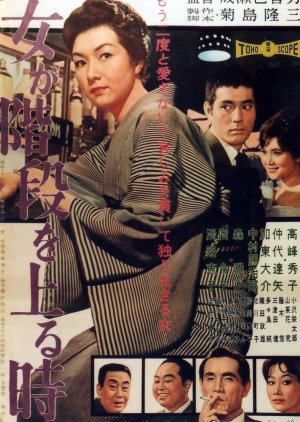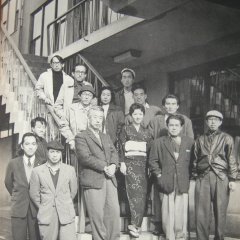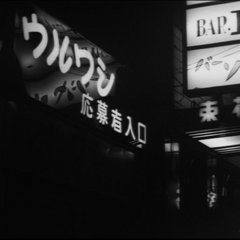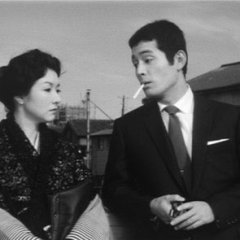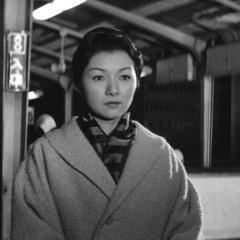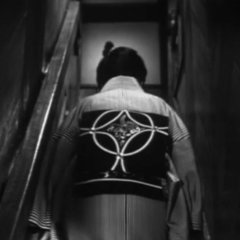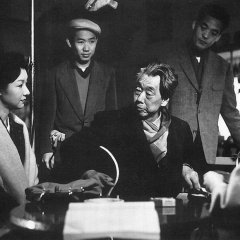- Português (Portugal)
- English
- magyar / magyar nyelv
- dansk
- Título original: 女が階段を上る時
- Também conhecido como: Onna ga kaidan wo agaru toki
- Diretor: Naruse Mikio
- Roteirista: Kikushima Ryuzo
- Gêneros: Vida, Drama, Melodrama
Elenco e Créditos
- Takamine Hideko Papel Principal
- Nakadai TatsuyaKomatsu KenichiPapel Secundário
- Mori MasayukiFujisaki NobuhikoPapel Secundário
- Ozawa EitaroMinobe TsuyoshiPapel Secundário
- Kato DaisukeSekine MatsukichiPapel Secundário
- Nakamura Ganjiro IIGoda YuzoPapel Secundário
Resenhas

Esta resenha pode conter spoilers
"The time to decide was looming"
When a Woman Ascends the Stairs showcased Takamine Hideko's acting range as Yashiro Keiko, a bar hostess who had come to a crossroads in her life. Elegant with a backbone of steel, Keiko struggled endlessly to do the right thing when doing the morally gray thing could deliver her dream of buying her own bar far quicker. Director Naruse never took it easy on his characters and Keiko was no exception, watching her courageously face setbacks with a concentrated determination was highly compelling."I hated climbing those stairs more than anything."
Keiko worked upstairs in a bar that catered to businessman entertaining their clients. The men liked having a pretty woman or two around as they made their deals. Because she was a widow in her 30's the younger hostesses and even the patrons called her Mama. Keiko and the bar manager (charismatic Nakadai Tatsuya) also dealt with the business side of collecting from the companies and businessmen who owed on their tabs. Keiko hated her job, but needed the money as she also provided for her mother and adult brother and young nephew. She had three choices to better her life—get married, buy her own bar, or find a patron to help supplement her lifestyle. At her age, she didn't think the first one was a possibility. Buying a bar required more cash than she had. The third one was a form a prostitution she wasn't ready to submit to.
"The best go by cab, the second-rate take the train, and the worst go off with their customers."
One of the younger women had left and started her own bar, but she found herself swimming in debt with creditors hounding her every move. Another hostess married and moved away. A third young woman had no problem exchanging sex for money. Wealthy customer Goda offered Keiko the capital to start a bar if she would be his mistress. A likeable customer proposed to Keiko and for a moment she was happy until she realized he had not been truthful with her. The man she had fallen in love with was also living a double-life. Every time it looked like she might have found happiness or an answer to her problems, fate was waiting around the corner to trample her. Despite always seeking to do the right thing she was seldom rewarded for it. This was Naruse, not Ozu, so not surprisingly the characters fought to survive and make a living, let alone find love. He preferred a more pessimistic worldview where obstacles confronted or crushed his characters at every opportunity. Whether it was more realistic is up for debate, but the conflicts and character growth did make for an entertaining film.
"Women working in the Ginza fought desperately for survival…it was a battle she couldn't afford to lose."
Keiko strove to get ahead financially only to have her family continually siphoning off her savings. She didn't enjoy drinking but did so to make money. She despised drunks pawing at her, but she tolerated them to make money. What she wasn't willing to do was to sell herself. During one particularly poignant moment near the end of the film, she revealed her character's strength and resolve in a captivating way that left her integrity intact.
"There are limits, even in business."
Beautiful Takamine Hideko brought an elegant grace and strength to Keiko. I thought she did a wonderful job of conveying a wide gamut of emotions, subtly and effectively. When she emoted more forcefully with anger or sorrow, it was believable and organic to the scenes. Mama was a complex character who wasn't perfect, she made mistakes but she also took care of the people around her. She knew when to draw the line with problematic behavior and when to walk away. She didn't rail at the patriarchal society that limited her options or the widening division of the classes. Keiko took her blows, dusted off her kimono, got back up and kept moving forward even when life refused to offer her something better. As the people around her encouraged her to loosen her grip on her integrity, Keiko stayed true to who she was. After weathering numerous personal storms and losses she refused to buckle. Whether it was acceptance or resignation, she continued to walk up the stairs she dreaded, paste on a fake welcoming smile, and somewhere deep inside hope that her efforts would grant her the future she dreamed of someday.
"…the trees that line the streets can sprout new buds no matter how cold the wind. I too must be just as strong as the winds that gust around me."
8/1/23
Esta resenha foi útil para você?
Recomendações
There have been no recommendations submitted. Be the first and add one.

